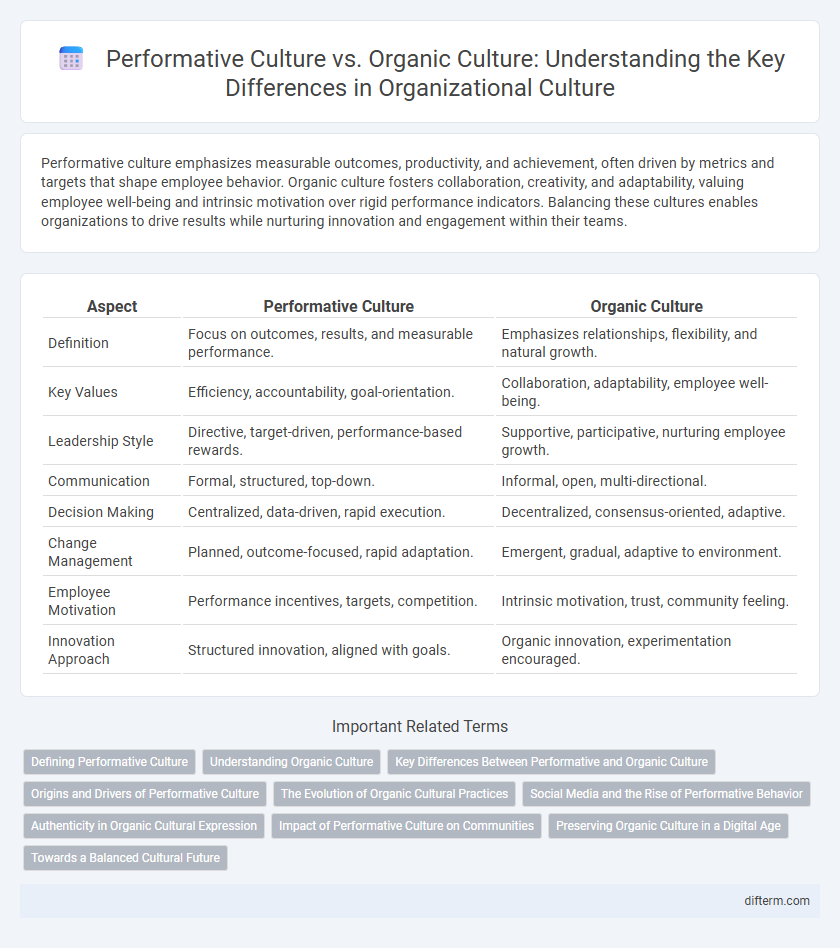Performative culture emphasizes measurable outcomes, productivity, and achievement, often driven by metrics and targets that shape employee behavior. Organic culture fosters collaboration, creativity, and adaptability, valuing employee well-being and intrinsic motivation over rigid performance indicators. Balancing these cultures enables organizations to drive results while nurturing innovation and engagement within their teams.
Table of Comparison
| Aspect | Performative Culture | Organic Culture |
|---|---|---|
| Definition | Focus on outcomes, results, and measurable performance. | Emphasizes relationships, flexibility, and natural growth. |
| Key Values | Efficiency, accountability, goal-orientation. | Collaboration, adaptability, employee well-being. |
| Leadership Style | Directive, target-driven, performance-based rewards. | Supportive, participative, nurturing employee growth. |
| Communication | Formal, structured, top-down. | Informal, open, multi-directional. |
| Decision Making | Centralized, data-driven, rapid execution. | Decentralized, consensus-oriented, adaptive. |
| Change Management | Planned, outcome-focused, rapid adaptation. | Emergent, gradual, adaptive to environment. |
| Employee Motivation | Performance incentives, targets, competition. | Intrinsic motivation, trust, community feeling. |
| Innovation Approach | Structured innovation, aligned with goals. | Organic innovation, experimentation encouraged. |
Defining Performative Culture
Performative culture emphasizes measurable outcomes, accountability, and performance metrics within organizations, driving employees to prioritize results over relationships. This culture fosters a competitive environment where success is quantified through targets, evaluations, and rewards, often linked to individual achievements. Unlike organic culture, which values collaboration and spontaneous innovation, performative culture relies on structured processes and explicit goals to guide behavior.
Understanding Organic Culture
Organic culture emphasizes fluidity, adaptability, and employee-driven values, fostering a collaborative and innovative work environment. Rooted in trust and shared beliefs, this culture allows organizations to thrive through informal communication and flexible hierarchies. Understanding organic culture involves recognizing its role in enhancing creativity, employee engagement, and long-term organizational resilience.
Key Differences Between Performative and Organic Culture
Performative culture emphasizes measurable outcomes, standardized procedures, and efficiency, prioritizing external validation and visible achievements within organizations. Organic culture values creativity, collaboration, and intrinsic motivation, fostering an environment where adaptability and employee well-being guide decision-making processes. Key differences lie in performative culture's focus on accountability and hierarchy versus organic culture's emphasis on trust, empowerment, and fluid communication channels.
Origins and Drivers of Performative Culture
Performative culture originates from organizational structures emphasizing measurable outcomes, driven by leadership's focus on targets, performance metrics, and accountability systems. This culture is propelled by external pressures such as market competition, regulatory demands, and shareholder expectations, fostering a results-oriented environment. In contrast to organic culture rooted in shared values and relationships, performative culture prioritizes tangible achievements and efficiency as core drivers.
The Evolution of Organic Cultural Practices
Organic cultural practices evolve naturally over time, rooted in the daily lives and traditions of communities without external imposition. This type of culture thrives on shared experiences, collective memory, and adaptive customs that respond to environmental and social changes. Performative culture, by contrast, is often staged or deliberately constructed to convey specific identities or values, lacking the intrinsic growth seen in organic culture's authentic development.
Social Media and the Rise of Performative Behavior
Performative culture on social media emphasizes curated self-presentation and exaggerated behaviors designed for views and likes, contrasting with organic culture characterized by authentic, spontaneous interactions. The rise of performative behavior is driven by algorithms that reward engaging content, incentivizing users to adopt staged personas and scripted narratives. This shift impacts social norms, fostering a digital environment where appearance often outweighs genuine connection and community building.
Authenticity in Organic Cultural Expression
Authenticity in organic cultural expression emerges from lived experiences and community practices, reflecting genuine values and traditions without external imposition or rigid structures typical of performative culture. This intrinsic authenticity fosters deeper emotional connections and sustainable cultural continuity, as expressions evolve naturally within the societal fabric. Performative culture often prioritizes visibility and spectacle, whereas organic culture prioritizes sincerity and rootedness, making its authenticity a vital component of cultural resilience.
Impact of Performative Culture on Communities
Performative culture prioritizes appearance and external validation, often leading to superficial engagement within communities. This emphasis on performance can undermine authentic relationships and trust, resulting in fragmented social bonds and reduced collective well-being. Communities shaped by performative culture may struggle with genuine collaboration and resilience compared to those fostering organic cultural development.
Preserving Organic Culture in a Digital Age
Preserving organic culture in a digital age requires prioritizing authentic community interactions and valuing traditional practices over performative displays driven by social media trends. Digital platforms often incentivize curated representations that can dilute the richness of cultural heritage, making it essential to create spaces for genuine storytelling and participation. Emphasizing education and local engagement supports the transmission of organic culture amidst rapid technological change.
Towards a Balanced Cultural Future
Performative culture prioritizes measurable achievements and visible behaviors, fostering efficiency and goal-oriented environments, while organic culture emphasizes authenticity, relationships, and adaptability rooted in shared values. A balanced cultural future integrates the strengths of both by promoting transparency and accountability alongside empathy and flexibility, enabling organizations to thrive amid dynamic social and economic landscapes. Harnessing this synergy supports sustainable innovation and inclusive growth, aligning performance metrics with human-centered practices.
performative culture vs organic culture Infographic

 difterm.com
difterm.com